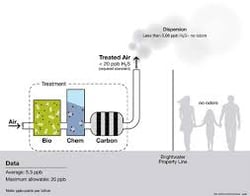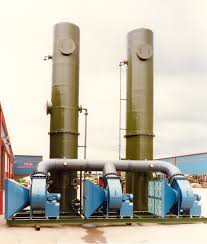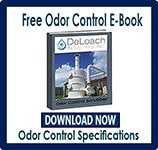Comparing Odor Control Scrubbers and Masking Agents: Finding the Optimal Solution
The water and wastewater industry has a constant need for dependable odor control systems that are reliable and effective. The most popular process types of scrubbers are biological and chemical scrubbers. Each is effective at treating and removing noxious odors that arise from hydrogen sulfide (H2S) and methane.
Chemical injection systems can include biological agents, hydrogen peroxide, or proprietary agents in addition to odor masking agents that do not react but rather cover up odors. Methane odors typically only appear in wastewater applications, but hydrogen sulfide can be present at either water or wastewater treatment facilities.
The common questions for deciding which type to use normally come down to two variables: “What will it cost to install and operate annually?” and “Are the odors caused by corrosive gases which need to be neutralized to prevent equipment damage, instead of just covering up the odorous smell?” In some cases, the remoteness of the location can also dictate the type of process to use. If the location is very remote with infrequent visits then it may make more sense to have a low-maintenance chemical masking or injection system installed. However, if the location does have frequent visits or an operator then the two previous rules normally govern the selection process. Quite often the selection is made improperly because of salesmanship or relationships to suppliers. This should be avoided at all times to prevent safety risks, damage to equipment, or high economical costs. Many times suppliers will offer discounted or even free equipment to secure chemical use contracts for a long-term commitment to chemical sales.
 When an odor control scrubber is selected it requires a more experienced operator to maintain and operate the equipment. A chemical masking system is typically comprised of a tank and some type of metering or injecting pump that once put into operation requires minimal to no adjustments. An odor control scrubber requires calibration, maintenance, and constant observance to keep operation at top performance. For more information or to learn more contact the professionals at DeLoach Industries Inc. at (941) 371-4995.
When an odor control scrubber is selected it requires a more experienced operator to maintain and operate the equipment. A chemical masking system is typically comprised of a tank and some type of metering or injecting pump that once put into operation requires minimal to no adjustments. An odor control scrubber requires calibration, maintenance, and constant observance to keep operation at top performance. For more information or to learn more contact the professionals at DeLoach Industries Inc. at (941) 371-4995.
Receive Your Free Odor Control E-Book
Related Blog: Which Type of Odor Control Scrubber is Best For Your Application? Biological Scrubber Vs. Chemical Scrubber





